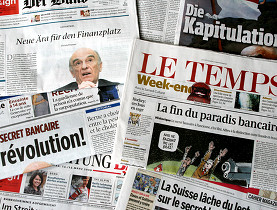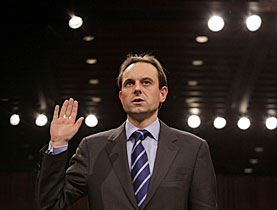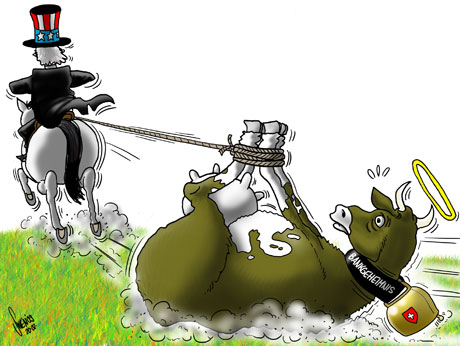Press bid farewell to paradise lost

Swiss newspapers have unanimously greeted the relaxing of Swiss banking secrecy as a timely and necessary decision, which saves the country from being blacklisted.
But after this historic concession, commentators point out that the time has come to move onto the offensive in negotiations to protect Switzerland’s competitive position.
Facing possible sanctions by the Organisation for Economic Cooperation and Development (OECD), Finance Minister Hans-Rudolf Merz announced on Friday the government’s decision to cooperate on cases of international tax evasion.
The finance story dominates the front pages of Swiss newspapers in all three language regions, with many pages more of analysis and reaction.
Headlines struck a dramatic note, from Le Temps declaring “The end of the banking paradise”, to Der Bund announcing “A new era for the finance sector”. The German-language tabloid Blick summed it up with one word – “Capitulation” – accompanied by a caricature of Merz waving a white flag.
Commentators broadly agree on the inevitability of Switzerland having to back down under such united and sustained international pressure.
The world’s major industrialised nations, known as the Group of 20, or G20, were to examine a proposal to blacklist Switzerland and other countries at a meeting in London at the beginning of April.
“New era”
The French-language newspaper 24 Hours draws a sporting analogy. Swiss banking secrecy was placed on the doping list by the most powerful countries in the world, it explains. Failure to make a concession would have meant Switzerland risking exclusion from the game.
The minister could not control the international dynamic, according to the Basler Zeitung, which added that the only one who can be pleased about the whole debacle is the honest taxpayer.
For the Berner Bund paper, a “new era” has begun. The decades-old pillar of the Swiss financial system has fallen. “In the struggle over bank secrecy it was less about morals and more about tax money.”
Geneva-based Le Temps newspaper called the move an “historic turn around” which “effects the prosperity of financial system, the economic balance of the country, its self image and its relation to the world.” From now on “Switzerland and its allies have the right to ask their detractors to revise their own legislation.”
The Neue Zürcher Zeitung also looked at what Switzerland can seek in return for this change, commenting that Switzerland would have to make counter demands for compensation for the anticipated damage to the finance sector in the new double taxation agreements.
“Discredited”
In a reflective tone, the Tages-Anzeiger reminds readers that Switzerland, as a small country, is dependent on international rules and accords, because they prevent large states from acting without scruples.
“By toeing the line with the OECD, Switzerland is not bowing to the dictates of a great power but recognising globally defined moral concepts,” it says.
The editorial goes on to make reference to the UBS fraud case in the United States. “Banking secrecy as applied up to now was first and foremost discredited through abuse”.
Further afield, the British newspaper The Guardian, which has run a series of articles on the issue recently, said Switzerland’s decision “to play by international tax rules was the result of a great deal of political arm-twisting, aided by the sting of scandal”.
However, the newspaper added that the struggle to get Switzerland to abandon banking secrecy was far from over. “There is still plenty of room for foot-dragging and hair-splitting and it is likely to be several years before any information is actually exchanged.”
In Germany, Die Welt daily newspaper runs with the headline “Swiss give up their sacred banking secrecy”. However, the paper notes that tax havens are just a symptom of capital flight and that the German tax authorities will not be able to cash in on their victory as long as nothing fundamental changes.
swissinfo
Banking secrecy is far from being a simply Swiss phenomenon. The European Commission is also targeting Belgium, Luxembourg and Austria. The Organisation for Economic Cooperation and Development also considers that Andorra and Monaco are non-cooperative tax havens, whereas Liechtenstein has cooperated with the EU since last year.
Banking secrecy is limited in Britain and the US but the two countries do have territories where it is less restrictive. Singapore has drafted plans in the general direction of the OECD. But when it comes to Hong Kong, China is deaf to EU demands for more transparency.

In compliance with the JTI standards
More: SWI swissinfo.ch certified by the Journalism Trust Initiative




You can find an overview of ongoing debates with our journalists here . Please join us!
If you want to start a conversation about a topic raised in this article or want to report factual errors, email us at english@swissinfo.ch.